Hemodialysis treatment is a critical procedure for those facing kidney failure, helping to filter waste and excess fluids from the blood when kidneys can no longer perform effectively. It allows patients to maintain a healthier life by managing symptoms and slowing disease progression. Hemodialysis can be done in specialized centers or, for some, comfortably at home. At VS Hospitals, we support every step of the dialysis journey, ensuring safety, expertise, and compassionate care for each individual’s needs.

What is Hemodialysis?
Hemodialysis treatment is a life-saving procedure for individuals with severe kidney failure, providing an artificial method to remove toxins, waste, and extra fluid from the blood. When kidneys are unable to perform these essential tasks, hemodialysis treatment steps in to help maintain a balanced and healthier body.
Key points of hemodialysis treatment:
- Uses a dialyzer or “artificial kidney” to filter blood
- Removes waste products and excess fluids
- Helps maintain essential electrolytes and blood pressure
At VS Hospitals, patients receive comprehensive guidance throughout the hemodialysis process, ensuring safety and comfort. Hemodialysis offers hope for a better quality of life even with kidney disease.
Why It’s Done
Hemodialysis treatment is done to help individuals with advanced kidney disease manage their health when their kidneys can no longer filter waste effectively. Without this treatment, harmful toxins, excess fluids, and waste would build up in the body, leading to severe health complications. Hemodialysis treatment provides crucial relief by taking over kidney functions.
Why Hemodialysis Treatment is Essential:
- Removes waste and toxins from the bloodstream
- Helps control blood pressure levels
- Balances body fluids and essential electrolytes
- Supports better energy levels and overall well-being
For many patients, hemodialysis treatment becomes a lifeline, preventing further health deterioration and improving their quality of life.
What Happens During Hemodialysis?
During hemodialysis treatment, the blood is filtered to remove waste, toxins, and excess fluids that the kidneys can no longer eliminate. This process takes place through a machine, commonly called a dialyzer, which acts as an artificial kidney.
Here’s a look at what happens:
- Blood Access: Blood flows out through a catheter or fistula, providing steady access.
- Filtration: The dialyzer filters out impurities, balancing essential minerals.
- Return of Clean Blood: Purified blood is safely returned to the body.
Each hemodialysis treatment session lasts about 3-4 hours, during which patients can relax or engage in activities like reading or watching TV.
Hemodialysis Treatment
Hemodialysis treatment is a life-sustaining therapy that removes toxins and excess fluids from the blood, essential for individuals with chronic kidney failure. The process replaces some of the kidney’s core functions, helping patients lead healthier lives. Hemodialysis treatment can be personalized based on individual needs, offering options in both medical centers and home settings.
Here’s what patients can expect:
- Frequency: Typically conducted 3-4 times per week.
- Duration: Each session lasts about 3-4 hours.
- Health Monitoring: Vital signs and blood chemistry are regularly checked to track progress.
With VS Hospitals’ specialized team, we ensure each patient receives attentive, professional support throughout the treatment.
What are the Two Types of Hemodialysis?
Hemodialysis treatment offers two main options, each suited to different needs and lifestyles: in-center hemodialysis and home hemodialysis. Both types effectively filter the blood, but they vary in convenience and flexibility.
In-Center Hemodialysis: Patients visit a specialized facility where trained professionals conduct and monitor each session, typically three times a week. This setup ensures consistent care and support.
Home Hemodialysis: With guidance and training, patients can perform dialysis at home, allowing more flexible scheduling and often shorter or more frequent sessions.
Each option provides effective treatment, and at VS Hospitals, we help patients choose the type that best supports their health and lifestyle.
Cost of Hemodialysis
The cost of hemodialysis treatment varies depending on several factors, such as location, frequency of sessions, and whether it’s done in a center or at home. At VS Hospitals, we offer transparent and affordable hemodialysis options tailored to patient needs. Understanding the cost helps patients and families plan for ongoing care and access any available financial assistance.
In-center Hemodialysis: Generally involves session-based fees, covering the use of equipment and professional care.
Home Hemodialysis: Costs may include home setup, equipment rental, and training for at-home care.
Insurance Coverage: Many insurance plans cover a portion of dialysis costs, easing financial burdens.
VS Hospitals provides flexible payment plans to ensure access to life-saving hemodialysis treatment for all patients.
Conclusion
Hemodialysis treatment can seem challenging, but with the right support, it becomes a manageable part of life. At VS Hospitals, we prioritize comprehensive kidney care, guiding patients through every step of the hemodialysis process to improve their quality of life. Our dedicated team provides advanced treatment options, personalized plans, and compassionate care to help patients maintain their health and well-being. For more information on hemodialysis treatment options and support, connect with us at VS Hospitals.
Read also Treatment For Kidney Stones
